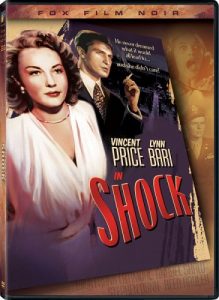Shock, a film noir classic with Vincent Price as the psychiatrist called to treat a woman after she’s in shock, having witnessed a murder – that he did!
Shock (1946), starring Vincent Price, Lynn Bari, Anabel Shaw, Frank Latimer
Product Description
By the time he arrives, she’s nearly comatose with shock. The hotel’s psychiatrist (Vincent Price) is called in to help. But just as she begins to recognize him as the murderer she saw …. He realizes she was a witness to his crime. So he arranges to take her to his private sanitarium where he and his nurse-mistress (Lynn Bari) can insure that no one takes the young woman’s ravings seriously and they can secretly administer enough “treatment” to silence her forever.Meanwhile, her husband and the police begin to suspect that everything is not as it seems and as they get closer to the truth, this complex mystery takes some unexpected twists!
Cast of characters
- Vincent Price (Madhouse) … Dr. Richard Cross
- Lynn Bari (The Baroness and the Butler) … Nurse Elaine Jordan
- Frank Latimore (13 Rue Madelaine) … Lt. Paul Stewart
- Anabel Shaw (Here Come the WAVs) … Mrs. Janet Stewart
- Stephen Dunne (Hand of Death) … Dr. Stevens (as Michael Dunne)
- Reed Hadley (The Dark Corner) … District Attorney O’Neill
- Renee Carson (The Picture of Dorian Gray) … Miss Hatfield – Head Nurse
- Charles Trowbridge (Sergeant York, The Man with 9 Lives) … Dr. H.J. Harvey
Editorial review of Shock courtesy of Amazon.com
Shock is an enjoyable film noir that belongs in a subgenre–let’s call it the psychoanalytic murder melodrama–which flourished after the success of Alfred Hitchcock’s Spellbound. Here, the set-up is delicious: nervous wife Anabel Shaw, already anxious about her soldier husband’s delayed return home, witnesses a murder in a neighboring hotel room. Going into a deep state of–you guessed it–shock, she needs the care of San Francisco’s leading psychiatrist, who just happens to be staying at the same hotel. Unfortunately, said analyst is none other than the murderer himself (Vincent Price), and he quickly realizes that if the lady comes out of her catatonic state, he’ll be exposed for killing his wife.
Things slow down once the action shifts to Price’s private sanitarium, but Lynn Bari is fun to watch as his va-va-voom assistant/mistress/femme fatale, and Price himself indicates his young aptitude for the kind of sinister, tortured roles that would make him a mainstay of Edgar Allan Poe stories. There’s also fun in listening to the psychoanalytic jargon spouted along the way, a distinctly Hollywood version of Freud. All in all, this unheralded 1946 picture counts at least as a minor rediscovery in the noir canon. –Robert Horton
